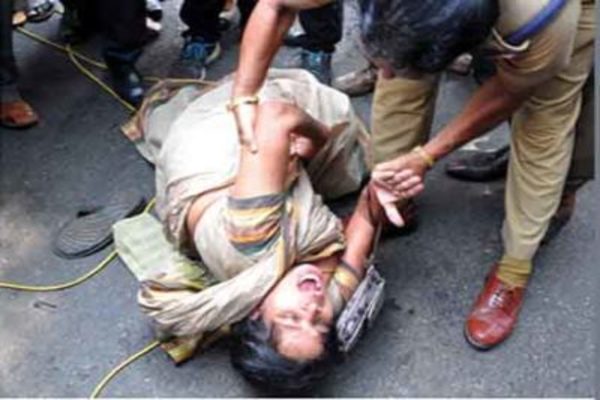06/04/2017
There are times when words fail you totally, leaving you hurt, insulted, powerless, stunned and full of fear. But words are all that you have. It was such a moment that we witnessed as citizen-spectators, when images of sheer brutality unleashed on a woman in search of justice unfolded on our television screens yesterday. Why do I feel that this moment marks, unfortunately, the culmination of a spate of violence women in this land have been suffering for quite some time now ? Why do I feel that it’s time to cry ‘Halt’ to all our claims of progressiveness and legacy of a rich revolutionary past and have a reality check? Because the State is failing us as women as we approach the citadels of law, order and justice. Because the state seems to know only one language -- that is the language of power, force and coercion.
As Mahija lay on the ground lamenting, dragged around and subjected to unbelievable cruelty only because she wanted to know if her son would be given justice, we realized that Jisha, Soumya ,the actress who went through a most tortuous time in the dead of night, and the countless women, girls and babies might not get the justice they deserve.
All our pretentions to literacy and democratic spirit fade into thin air when those political beliefs and institutions in which people have reposed faith fail them miserably. If a woman like Mahija, who lost her son to a shamefully predatory business called education, is trampled upon by police boots, where are we heading as a civil society?
It’s said that a policeman’s lathi is a larger version of the teacher’s cane in school. Mothers and fathers, we better know that there is no system here to save us and our children from oppressive class rooms. We are no longer in a society where law is tempered with mercy. There should be space in a police station to keep aside the rulebook and treat a tearful mother, a broken father and a desolate individual with compassion. Just the presence of women in police uniforms doesn’t feminize the space; I thought I glimpsed shadows of pathos on the faces of the police women who had to carry a shattered mother in their arms. But then we are in a place where the state disowns the police and vice versa. So where do we go from here? In these unabashedly aggressive, ruthless times to whom do we complain?
In our ancient legends, words of aggrieved women were believed to have tremendous power. If they cursed, the evil ones turned to ashes; their curses could turn men into women; the smoldering grief of a bereaved mother could scorch the enemy king’s limbs; their curses endured through many births of wrongdoers. I always felt the power to curse was the power given to the helpless to have faith, to endure and to believe in their struggle. Mahija has become a symbol of many a broken promise of justice. Watch out for her words; in her sorrow burns a prophetic curse.

